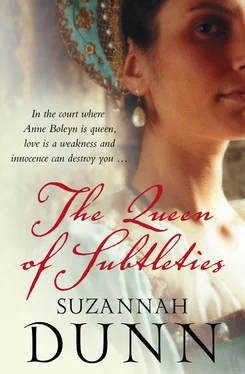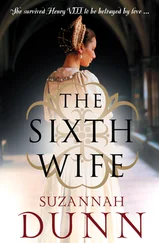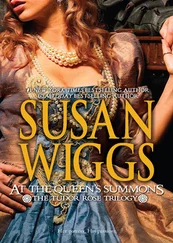I wouldn’t have known those letters were from Henry but for the handwriting, the signature. They had nothing in them of the king that I or anyone else knew; our valiant, bombastic king. In these letters was someone at sea, in the dark.
Anne, yesterday you said…
Anne, please, may I just…?
His problem was that he’d never been in love. This was unknown territory, for him. He’d lusted after women, yes. And there’d been women whose company he’d loved: he was a man who loved company, and there had been women. His marriage was testament to his chivalry, if nothing else. But in love? At someone’s mercy? No, never. Not until me.
Not that this was enough, for me. Not enough to make me love him. Enough to stop me in my tracks, certainly, but to turn my head? No. All those letters, the walks in the gardens, the trysts that he requested: lovely though they were, they didn’t do the trick. During those first weeks, he confided in me: his family, his horses, music, books, buildings, faith, France and Spain. I did warm to him, I’ll admit, finding him mostly untouched despite the weight of the world on his shoulders. I listened, but deflected his questions. Keeping my distance, giving no ground.
It wasn’t that I didn’t like him. I did; by this time I liked him a lot. Funnily enough, what I liked in him was something that I loathe in everyone else: conservatism. It was understandable, in his case: part of the job. He wasn’t a natural at it, though, which made him perfect prey for me to rib. And I do love to rib. And with no one but him was there ever enough danger, for me; no getting beneath the skin. He loved to be ribbed, perhaps because no one had ever dared do it. He was ripe for it, and I was match enough for him.
Winter came and there wasn’t a single day, I don’t think, when it didn’t rain. Wolsey began 1526 cheerfully, though, with a springclean. His vision was a tidied royal household. One result was that my brother George lost his place in the Privy Chamber. Nothing personal, we were assured. He was just one of the six closest companions to the king to lose his job. Another, incidentally, was our cousin Francis. Gentlemen of the Privy Chamber down from twelve to six; just one of the cuts.
George was livid to have been so close to the centre and now be just another courtier. And—worse—guess who was in? Our brother-in-law, Mary’s new husband: inoffensive William. William Carey: the name speaks for itself. And nice Harry Norris: Groom of the Stool, now, and Keeper of the Privy Purse (and who could be closer to a constipated, spendthrift king?). And cute Franky Weston, with his then not-quite-broken voice: he was taken on as a page. No one could ever have said that my brother or cousin were caring or nice or cute; theirs were different strengths. Not that it made much difference, in the end. Because they’re all dead now, except Francis. Francis probably couldn’t die unless a stake were driven through his heart. If he had a heart.
Not a stake through the heart, but a splinter in an eye: dashing Francis lost more than his place in the Privy Chamber, that year. It happened at the usual Shrovetide joust. Henry had ridden into the tiltyard on Govenatore, who was new to him then and perhaps even keener than him to make an impression. The horse played to the audience; and Henry, though loving the challenge and the spectacle, had his hands full. Hannibal Zinzano, the horsekeeper, was, I noticed, watchful at the side. It wasn’t for Govenatore, though, that the crowd gasped; it was for what was embroidered in scarlet across the king’s gold-and-silver chest: No Comment. Recognition rippled through the crowd as Henry cantered around and people saw it or had it translated for them. Everyone knew what it meant: there was someone; someone new. They thrilled to it; it was a game to them, a laugh. His own smile, if there was one, was behind his visor. I don’t think he looked at me. He didn’t need to. Me, I had no such luxury. Like everyone else, I was there to spectate.
I couldn’t quite believe he’d done it. Indeed, I wasn’t quite sure what it was that he’d done. Didn’t know quite what to make of it. This declaring that he wouldn’t declare. This being so public about his privacy. Was I in on the joke, or was the joke on me? And then, as I watched him skittering around the yard, it was as if the joke unfurled. This is what I saw: that when he’d had the idea, he would have had to go to Mr Jaspar, his tailor, and discuss design and colour; and later, he’d have had to take delivery of it, and express his appreciation. And on the morning of the joust, he’d have had to arrive at the stables in it to do his best with Govenatore. What I saw wasn’t the seriousness of Henry’s pursuit of me. Quite the opposite. What I saw was that it was a practicality, sometimes; and others, almost an irrelevancy. It was a fact of his life.
I saw it, and I turned away; I turned to my little cousin Maria. She and Hal, Uncle Norfolk’s children, were at court for distraction from the worst of their parents’ separation, and they’d come along with me to the joust. Maria was snuggled up to me and I turned to check she was wrapped tight against the cold. Behind me came a distinctive crowd-gasp: low, blunt. I snapped back to see Harry Norris sprinting across the tiltyard. He was aiming for Henry and Francis, who were dismounted and fighting, or so it looked: Henry, trying to hold Francis’s visored head; and Francis, frantic, reeling, crouching, pushing him away. The horses stood by, helpless; Governatore, subdued. Henry’s shouting was becoming words, a name: Vicary; get Vicary . His surgeon.
Vicary’s good but he can’t perform miracles. In the days after the accident, Francis’s eye dried up and he never again removed the patch. It doesn’t seem to have hampered him. On the contrary. Somehow he looks more dashing with it. No one knew how it had happened, that splinter into Francis’s eye; not even Henry or Francis. Francis and I were good friends, back then; Francis and George and I. He was one of us. But that hasn’t been true for a while now, to say the least, and I have found myself wishing that I’d seen it and could relish the memory of it: that sly, stunning blow.
No comment? But those in the know, already knew. Privacy at court is scarce; and, of course, the bigger you are, the less you have. There was all the Dance with me, Anne; and only so many ruby earrings that I could explain away and sugar stallions that I could get the boys to eat. I was beginning to understand that my resistance was, to a great extent, irrelevant. Word was that the king was obsessed with Anne Boleyn; and no one cared about the details, such as which favours he was or wasn’t being granted. Why not play along with it, then? Go with it, get what I could from it? In a way, I didn’t have a choice. Or, that wasn’t the choice; the choice was not to end up as mother to some half-royal son and wife to some compliant, paid-off nonentity. That, I definitely wouldn’t have. But why not have some fun, for a while? I should have been Countess Northumberland, with my own vast household, but instead I was still in the queen’s rooms—all that praying and sewing—with no other suitor daring to raise his head. Why shouldn’t I have a little fun, perhaps, and some jewellery?
So, I went to Henry, one evening, after a year or more of his attentions; I went changed, resolved, chancing it. He didn’t register my change and was as unassumedly welcoming as usual: this king who, for my sake, was learning to live with so little of what he most wanted. I loved it, that evening: his guilelessness, openness. It dizzied me, made me tender. He was a sweet-natured man, in those days. His real nature is that of a soft-hearted man. At the end of that evening, when everyone had gone, I was still there. Me, the six weary musicians, and a whey-faced Franky Weston who was on duty to prepare Henry’s bed. Outstaying my brother and the others—cousin Francis, Harry, Billy—had taken some doing, even for me. Did I say evening? The small hours, more like. The banquet table was littered with sugar lemons, oranges, figs and walnuts that had been cracked open and chiselled away at, bitten into: shells, now, on a sugary sand. I told Henry that I’d like a word. ‘In private,’ I said, quietly.
Читать дальше












